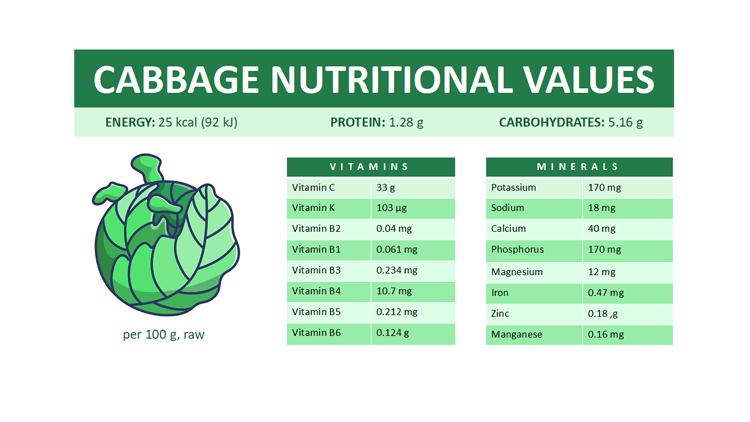When dealing with a diabetes diagnosis, it’s crucial to implement fundamental measures like maintaining a healthy lifestyle with a diverse diet and regular exercise. But keeping up with these basic principles can often be challenging and even stressful for many individuals.
If you’re feeling limited in your food choices due to your diabetes, there’s no need to worry. The humble cabbage, a highly nutritious and budget-friendly vegetable, is here to help!
Packed with health benefits that are especially beneficial for those with diabetes, cabbage is an excellent addition to any meal.
Nutrition Facts about Cabbage
Prepare to be blown away by the nutritional value of cabbage! This unassuming leafy green may not seem like much, but it packs a mighty punch when it comes to essential minerals like calcium, potassium, and phosphorus, as well as vitamins such as C, K, A, and folate. And that’s just the tip of the iceberg! With glucosinolates, flavonoids, anthocyanins, and carotenoids, cabbage is also chock-full of beneficial compounds that can work wonders for your health. [1]
But the benefits of cabbage don’t stop there. With its low sugar content and high dietary fiber, it’s an excellent option for maintaining a healthy digestive system. [1] Plus, with a glycemic index (GI) of around 10, it’s a fantastic choice for those seeking foods with a low GI. [2]
And if you need one more reason to love cabbage, consider this: just 100 grams of raw cabbage contains a staggering 41% of your daily vitamin C requirement! [1] So whether you’re looking to boost your immune system, improve your digestive health, or simply add more nutrition to your meals, cabbage is a perfect choice.
For even more nutritional information about cabbage, check out the figure below and start incorporating this amazing vegetable into your diet today. With all its health benefits and culinary versatility, cabbage is truly a nutritional powerhouse.

Benefits of Eating Cabbage with Diabetes
Cabbage is really a versatile and affordable vegetable that provides numerous health benefits. Beyond its status as a food staple, it also has functional potential in managing glucose homeostasis and reducing the risk of complications in people with diabetes, promoting overall health. [3]
Blood Sugar Levels Regulation
Did you know that the GI ranks foods based on their increase in blood sugar levels after eating a meal? It is important to understand that not all carbohydrates are equal; different types of carbohydrates produce varying glycemic and insulinemic responses.
Due to their capability to manage blood sugar levels, reduce insulin resistance and even reduce the risk of complications, low GI foods have gained a lot of attention in recent years. By incorporating cabbage into your diet, you can therefore contribute to gaining control of your health and managing your diabetes more effectively. [3]
Protecting your Cardiovascular Health
By regulating high blood sugar levels, cabbage can also contribute to preventing disturbed blood cholesterol balance – a condition called dyslipidemia, which is an important risk factor for cardiovascular diseases. [4]
But that’s not all – cabbage is also a rich source of antioxidants like flavonoids and anthocyanins that help protect your body against oxidative stress and inflammation. These properties are key in reducing the risk of dyslipidemia and promoting better cardiovascular health. [5][6]
Helping you Fight Against Obesity
Obesity is a well-known risk factor for the development of type 2 diabetes. Incorporating foods like cabbage into your diet may be helpful in managing your weight problems.
Cabbage is low in calories but high in fiber, making it an excellent food choice for weight loss. The high fiber content in cabbage can promote feelings of fullness, reducing overall calorie intake. [5]
Additionally, cabbage has a low GI and contains few carbohydrates, which can help regulate blood sugar levels, prevent insulin resistance, and contribute to weight reduction. Compounds found in cabbage inhibit the activity of digestive enzymes involved in carbohydrate and lipid metabolism, which can also benefit your weight managment. [5][7]
Cooking Tips for Diabetic-friendly Cabbage Recipe
Notwithstanding all the above, it’s important to prepare cabbage in a way that preserves its beneficial properties. To reap the benefits of cabbage, it can be consumed in various forms, including raw, cooked, fermented, or as a juice. However, when cooking cabbage, it is recommended to avoid overcooking it, as this can reduce its nutrient content. [5]
Here are some cabbage cooking tips:
- Use colorful cabbage varieties: Cabbage comes in a variety of colors, including green, purple, and white. Using a mix of colorful cabbage varieties can add visual interest and boost the nutritional content of your dish. [8]
- Add flavor with herbs and spices: Cabbage has a mild flavor that can be enhanced with herbs and spices. Some diabetic-friendly options include garlic, ginger, turmeric, and cinnamon. [9]
- Incorporate lean proteins: To make a complete meal, consider adding lean proteins like chicken, turkey, or tofu to your cabbage dish. This can help balance out the carbohydrates and keep you feeling full. [10]
- Watch portion sizes: While cabbage is a low-calorie vegetable, it is still important to watch portion sizes to avoid overeating. Aim for 1-2 cups of cooked cabbage per serving. [11][12]
Websites like Diabetes UK [13] and Diabetes FoodHub [14] are excellent resources for finding delicious, diabetes-friendly cabbage recipes.
FAQ
Can Type 2 Diabetics Eat Coleslaw?
Yes, type 2 diabetics can eat coleslaw. However, it is important to choose a coleslaw recipe that is low in sugar and high in fiber. Instead of using sugar or high-calorie dressings, consider using vinegar, lemon juice, or a light vinaigrette. [15]
Is Red Cabbage Good for Diabetics?
Yes, red cabbage is good for diabetics. Like green cabbage, red cabbage is low in calories and carbohydrates and high in fiber and vitamins. Additionally, red cabbage contains anthocyanins, which are antioxidants that can help improve blood sugar control. [16]
Is Cabbage Soup Good for Diabetics?
Cabbage soup can be a healthy and filling meal option for diabetics. However, it is important to choose a recipe that is low in sodium and high in fiber. Avoid using cream or high-fat ingredients and consider adding lean protein sources such as chicken or tofu. [16]
Are Cabbage Rolls Healthy for Diabetics?
Cabbage rolls can be a healthy and satisfying meal option for diabetics. However, it is important to choose a recipe that is low in carbohydrates and high in fiber. Instead of using rice or bread crumbs, consider using quinoa or cauliflower rice as a filling. [16]
Final Thoughts
Incorporating cabbage into your diet can provide numerous health benefits, especially for those with diabetes. With its high nutritional value, low GI, and potential to manage blood sugar levels, cabbage is an affordable and versatile vegetable that can help you maintain a healthy lifestyle. Additionally, its ability to promote cardiovascular health and weight loss makes it a valuable addition to any diet.
So, what are you waiting for? Start incorporating cabbage into your meals today and reap the benefits of this amazing vegetable! Try adding it to soups, stir-fries, salads, or even as a side dish to your favourite main course. Your taste buds and your health will thank you for it!
References
- FoodData Central. Accessed February 26, 2023. https://fdc.nal.usda.gov/fdc-app.html#/food-details/169975/attributes
- Cabbage nutrition, glycemic index, calories, net carbs & more. Accessed February 26, 2023. https://foodstruct.com/food/cabbage
- Uuh-Narvaez JJ, Segura-Campos MR. Cabbage (Brassica oleracea var. capitata): A food with functional properties aimed to type 2 diabetes prevention and management. J Food Sci. 2021;86(11):4775-4798. doi:10.1111/1750-3841.15939
- Hedayatnia M, Asadi Z, Zare-Feyzabadi R, et al. Dyslipidemia and cardiovascular disease risk among the MASHAD study population. Lipids Health Dis. 2020;19(1):1-11. doi:10.1186/S12944-020-01204-Y/TABLES/4
- Moreb N, Murphy A, Jaiswal S, Jaiswal AK. Cabbage. Nutritional Composition and Antioxidant Properties of Fruits and Vegetables. Published online January 1, 2020:33-54. doi:10.1016/B978-0-12-812780-3.00003-9
- Kataya HAH, Hamza AEA. Red Cabbage (Brassica oleracea) Ameliorates Diabetic Nephropathy in Rats. Evid Based Complement Alternat Med. 2008;5(3):281. doi:10.1093/ECAM/NEM029
- Podsȩdek A, Majewska I, Kucharska AZ. Inhibitory Potential of Red Cabbage against Digestive Enzymes Linked to Obesity and Type 2 Diabetes. J Agric Food Chem. 2017;65(33):7192-7199. doi:10.1021/ACS.JAFC.7B02499/ASSET/IMAGES/LARGE/JF-2017-024993_0002.JPEG
- Tangy cabbage slaw recipe | BBC Good Food. Accessed February 27, 2023. https://www.bbcgoodfood.com/recipes/tangy-cabbage-slaw
- Jovanov D. Herbs and Spices for Diabetes. International Journal of Nutritional Science and Food Technology. 2017;3(1):26-29. doi:10.25141/2471-7371-2017-1.0026
- Budget-Friendly Chicken Sausage and Cabbage Skillet. Accessed February 27, 2023. https://www.diabetesfoodhub.org/recipes/budget-friendly-chicken-sausage-and-cabbage-skillet.html
- Portion sizes and diabetes | Diabetes UK. Accessed February 27, 2023. https://www.diabetes.org.uk/guide-to-diabetes/enjoy-food/eating-with-diabetes/portion-sizes
- Diabetes Diet, Eating, & Physical Activity | NIDDK. Accessed February 27, 2023. https://www.niddk.nih.gov/health-information/diabetes/overview/diet-eating-physical-activity#howMuch
- Diabetes UK – Know diabetes. Fight diabetes. | Diabetes UK. Accessed February 27, 2023. https://www.diabetes.org.uk/
- Diabetes Food Hub. Accessed February 27, 2023. https://www.diabetesfoodhub.org/
- Savoy Coleslaw | Diabetes UK. Accessed February 27, 2023. https://www.diabetes.org.uk/guide-to-diabetes/recipes/savoy-coleslaw
- Diabetes diet: Create your healthy-eating plan – Mayo Clinic. Accessed February 28, 2023. https://www.mayoclinic.org/diseases-conditions/diabetes/in-depth/diabetes-diet/art-20044295


